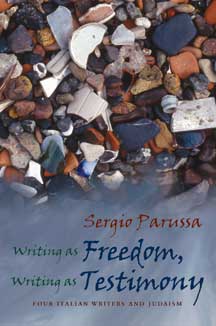Professor Sergio Parussa Explores Judaism in
the Works of Four 20th-Century Italian Writers
FOR IMMEDIATE RELEASE:
February 19, 2009 |
|
 WELLESLEY,
Mass. -- In Writing as Freedom, Writing as Testimony (Syracuse University Press, 2008), Sergio Parussa, associate professor of Italian studies at Wellesley College, explores the relationship between Judaism and writing in the works of four 20th-century Italian writers: Umberto Saba, Natalia Ginzburg, Giorgio Bassani and Primo Levi. Parussa examines the ways in which each author’s work responds to Judaism and the notion of Jewish identity. WELLESLEY,
Mass. -- In Writing as Freedom, Writing as Testimony (Syracuse University Press, 2008), Sergio Parussa, associate professor of Italian studies at Wellesley College, explores the relationship between Judaism and writing in the works of four 20th-century Italian writers: Umberto Saba, Natalia Ginzburg, Giorgio Bassani and Primo Levi. Parussa examines the ways in which each author’s work responds to Judaism and the notion of Jewish identity.
“My inspiration to write Writing as Freedom, Writing as Testimony came from friends, books and from the beautiful and deep history of the Italian Jewish community, which is the most ancient Jewish community in the Western world,” Parussa said. “The research began when I was a graduate student at Brown University and continued in Italy and at Wellesley, as well as at the Oxford Center for Hebrew and Jewish Studies, where I was a visiting fellow during my year of sabbatical leave.”
With great detail, Parussa shows how the four writers reflect a change in attitude toward Judaism that occurred in Italian society between the mid-19th and mid-20th centuries, from a perception of Jewish identity as a constraint to one’s freedom to an understanding of it as a tool of intellectual freedom that can contribute to one’s sense of identity.
For these authors, the recovery of Judaism consists not only of telling stories with Jewish subject matter but also of the repeated act of remembering, a process by which, as Parussa puts it, "the past is salvaged from oblivion by means of its reactualization in the present." Through memory, he suggests, one becomes free to affirm difference and to make Jewish traditions an integral part of Italian culture.
“I hope that my book will raise the interest of American readers in this history and will make them curious about the works of the four Italian writers I discuss,” Parussa said. “I hope also that my book will help to open the field of Italian studies, which has been characterized traditionally by philological and historical approaches, to newer methodologies of literary studies, such as Jewish studies and cultural studies.”
For more on his new book, go to http://www.syracuseuniversitypress.syr.edu/fall-2008/writing-freedom-writing-testimony.html.
Parussa received a bachelor of arts degree from the University of Turin and a PH.D. in Italian studies from Brown University with a specialization in 20th-century Italian and French literature. He is also the author of Eros Onnipotente: erotismo, letteratura e impegno nell'opera di Pier Paolo Pasolini e Jean Genet (Tirrenia, Stampatori, 2003). His work also includes the translations of L'Orso Maggiore by Ginevra Bompiani, as The Great Bear (Italica Press, November 2000), and Simonetta Perkins by L.P. Hartley (Nottetempo, 2008).
Since 1875, Wellesley College has been a leader in providing an excellent liberal arts education for women who will make a difference in the world. Its 500-acre campus near Boston is home to 2,300 undergraduate students from all 50 states and 68 countries.
###
|

